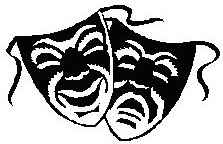![]()
![]()
![]()
![]()
![]()
![]()
![]()
![]()
![]()
 |
Tragedies and Comedies |
 |
| The Greeks gave the world
tragedies and comedies. William Shakespeare, 2,000 years later, divided his
plays into these two types: for example, Macbeth and Hamlet are tragedies,
and Much Ado About Nothing and Twelfth Night are comedies. The Greeks used
different kinds of masks for tragedy and comedy, and this is what gives us
our symbol for the theatre.
|
|
Tragedy Tragedy comes from the Greek word tragoidia, which comes from two words - tragos, meaning goat, and oidia, meaning song. So does tragedy mean goat-song? Scholars think that tragedy means something more like song for the prize of a goat, or for the sacrifice of a goat. Sacrifices of animals like goats was a very important part of the Dionysia (and of worshipping the gods in general). |
A modern performance of Medea
|
Stories from
Myth Tragedies were written about heroes from myths, like the Iliad or the Odyssey by Homer, or the stories of Heracles or Theseus. They usually showed how even a great hero could have a weakness which led to some terrible event. For example, Jason's unfaithful treatment of his wife Medea, in the play Medea by Euripides, leads her to murder her own children in revenge. We see the same in Shakespeare - for example, how Macbeth's ambition and his wife's domination lead him to murder, and eventually to his own death. |
|
| The Ideas in
Tragedy Because playwrights had to write three tragedies each year, it was much easier to borrow plots from myths than to invent new ones. The cleverness was in the writing, the dialogue, and the ideas about human beings and gods expressed in the plays. The playwrights could examine the customs and moral values of the time, and make the audience question what was right and wrong. This was a totally new idea, which the Greeks gave the world. People were encouraged to think for themselves, and to persuade others based on reason. Until then people had always accepted what they had been told to believe. The most famous writers of tragedy are Aeschylus, Sophocles, and Euripides. |
 scene on a vase showing the end of Medea by Euripides - Medea rides into the sky after killing her children
|
Comedy Comedy comes from the Greek word komoidia - komos meaning a group revel (i.e. having fun) and idia meaning song. Comedies were introduced to the play competition in 486BC. Unlike tragedies they were of course, for people to have fun and laugh at. They were about what was going on in the Greek world at that time, not old myths. Playwrights could make fun of important people, like Pericles, the ruler of Athens, or Socrates, the famous philosopher. The first comedies ('Old Comedy') were chaotic, full of slapstick and farce, and often quite obscene. And very funny! The most famous writer of Old Comedy is Aristophanes. Click here to read one of his plays, Clouds. Later comedies (called 'New Comedy') were more organised and about everyday people. Its most famous writer is Menander. |
![]()
![]()
![]()
![]()
![]()
![]()
![]()
![]()
![]()